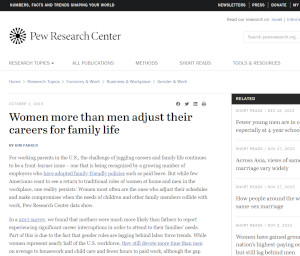Pew Research Center short article addressing challenges faced by working parents in the U.S., emphasizing the need for supportive policies and cultural shifts in workplaces.
Pew Research Center data shows that women most often are the ones who adjust their schedules and make compromises when the needs of children and other family members collide with work. Mothers were much more likely than fathers to report experiencing significant career interruptions in order to attend to their families’ needs.
Among working parents of children younger than 18, mothers in 2013 spent an average of 14.2 hours per week on housework, compared with fathers’ 8.6 hours. And mothers spent 10.7 hours per week actively engaged in childcare, compared with fathers’ 7.2 hours.
According to many economists, family-related career interruptions can undermine women’s economic prospects in a variety of ways, by contributing to the gender wage gap and by narrowing the pipeline that feeds top-level jobs.
Pew Research Center data suggest that a generational shift, if not a culture change, may be coming. When they asked young adults (ages 18 to 32) who don’t yet have children whether they anticipate that becoming a parent will make it harder or easier for them to advance in their job or career, young men were just as likely as young women to say that children will likely slow down their career advancement (roughly 60% in each group).




